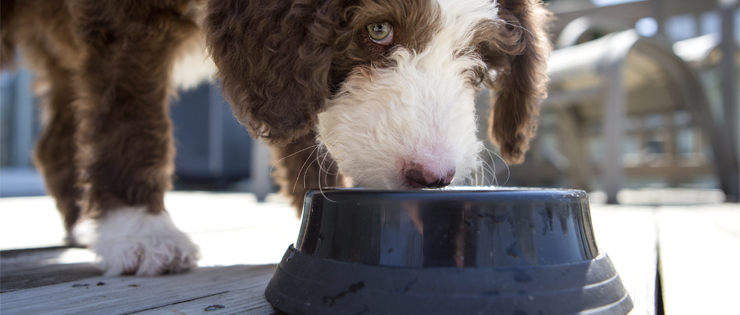
They say you are what you eat. Humans are currently amongst the height of food crazes, from Paleo and Atkins to Detox Teas and Alkaline diets. We are insatiably looking for the next way to get fit and lose weight. But what about our pets? What is in their food bowl these days, and are we doing what’s best by them?
Dogs and cats require very different diets, and that is because they have evolved to depend on very different foods. Dogs are omnivorous, meaning they eat meat and plants, whilst cats are pure carnivores, meaning they eat almost exclusively meat. This means that when deciding on the best diet for your pet, you need to be informed of what their dietary needs are.
Pet food is a multibillion dollar industry in Australia, and there are many different types of ingredient dos and don’ts out there. Some frown at grain-filled foods, others question the percentage of protein in each meal and many believe raw is much better than cooked meat. So, with all this information out there, what is best for your pet?
The first thing to ask yourself is, is my pet healthy?
If what you are currently feeding your pet is causing them to thrive, then I would change their diet with great caution. Sometimes we go looking for something better, when in fact what we already have is perfectly sufficient. Having said that, we can always look after ourselves better, and that includes the diet of our dogs and cats, as well as our own. So here are some things to look for when deciding on what diet is right for your beloved pet:
- Ensure your dog gets plant-based food in their diet as well as meat. They are not carnivores, so it is important they ingest fibrous foods as well as protein.
- If feeding a raw diet, ensure it has been refrigerated and served immediately from the fridge or at least lightly seared. There is a risk that raw meat can be riddled with dangerous bacteria, which can make your pet sick.
- If you decide to make your pet’s meal from scratch, you may need to include supplements in their diet. Many high-end kibble diets already include these minerals in the food, so it is worth looking into the benefits of omega fatty acids, choline, calcium, zinc, vitamins A, C, E, K and the B vitamin group to name a few.
- Consider a starve day, or a day where your pet gets a raw brisket bone (the bone must be large enough to not fit in your pet’s mouth). The 5/2 diet for humans is proving valuable; alleging to reduce cholesterol and enhance metabolic efficiency*. This can be beneficial for dogs who suffer from obesity, or who are prone to obesity.
*It is important to note here that the 5/2 diet is human oriented, so if your dog is receiving a balanced healthy caloric intake each day, this approach may not be appropriate.
- All bones must be raw. If they are cooked they can splinter and rupture the digestive tract of your pet.
- Natural is not always best. Often, we fall for the Appeal to Nature fallacy, believing that what is natural must be better. But, nature is fraught with dangers, including the risk of disease (raw diets).
- Some pets suffer from food allergies and require specialised diets. Often, these are better given in the form of specialised kibble. Whilst many kibble diets are full of flavours, fillers and everything in between, there are many high-end balanced kibble brands that promote optimal pet health. Discuss these with your trusted vet or pet nutritionist.
- Don’t change the diet if you don’t need to. If your pet is healthy, full of life and not overweight, you may be unnecessarily changing things for the sake of it.
- The following foods are potentially harmful to dogs and cats: chocolate, coffee or caffeinated products, onions, garlic, rotten or composted foods, breads and yeasted products, avocado, grapes, raisins, sultanas and foods with currants in them, nuts, fruit stones (pits), corn on the cob; tomatoes, mushrooms, fatty foods.
We all want our pets to thrive in life, and diet plays a critical role in this. Just like us, a varied and appropriate diet for your pet is necessary for optimal health. Not only does good food maintain a healthy body, it helps to promote a healthy mind too. As an animal behaviourist, this is music to my ears! When a dog feels positive, they behave accordingly.
Bon Appetit!